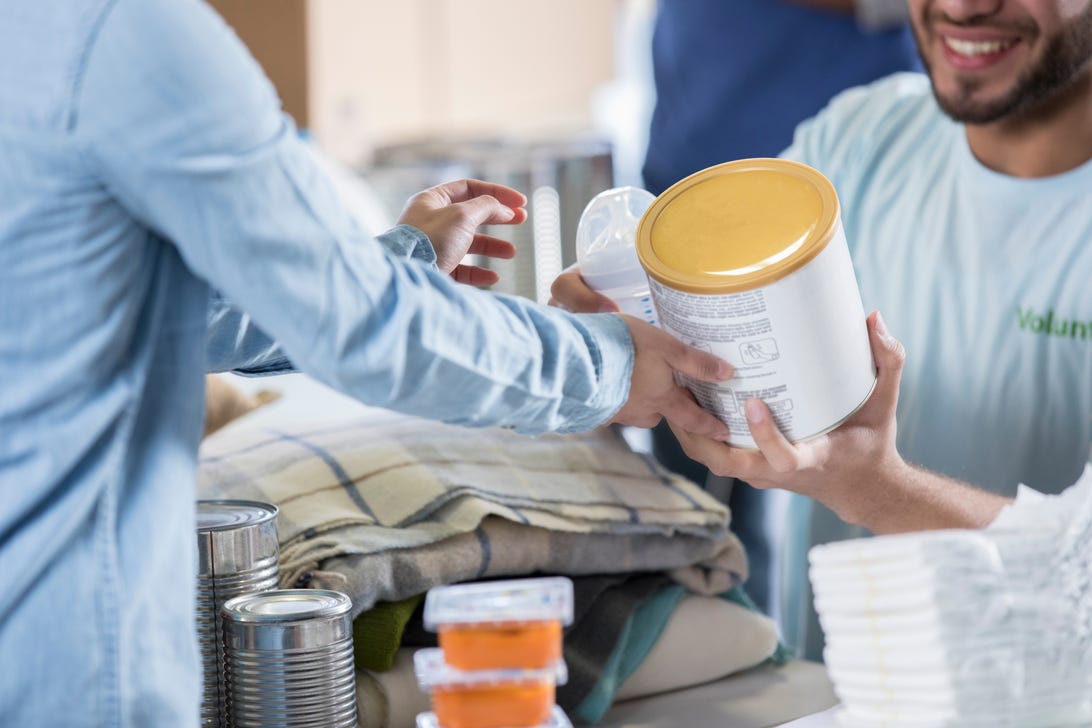[ad_1]
The ongoing baby formula shortage in the US, which stems from the recall and subsequent closure of a large formula plant, continues to make it exceptionally difficult for many parents to meet their babies’ nutritional needs. The Senate on Thursday approved the Access to Baby Formula Act, and the Biden Administration’s Operation Fly Formula initiative began flying in formula from Europe over the weekend.
The US Food and Drug Administration has announced plans to loosen some importation restrictions on formula from other countries and work with formula manufacturers to increase production.
Guidelines for WIC, the Special Supplemental Nutrition Program for Women, Infants and Children, have also been relaxed in some states, and all are encouraged to follow suit, per a request from the White House and the US Department of Agriculture. Parents should be able to return recalled formula in exchange for a wider variety of products, and requirements for medical waivers or other restrictions should be loosened, the USDA says. (Program details vary by the state — find your local office here.)
If you’re running low on formula, here’s what pediatricians say to do and where to go.

Delmaine Donson/Getty Images
Where to look for baby formula if yours is out of stock
Retailers including CVS, Walgreens and Target have all placed limits on how many products you can purchase at once. Despite this, shelves in some stores are bare.
If you can’t find your formula, call your pediatrician to see if they have any in stock. Pediatricians often get samples of different formulas and may be able to help out, says Dr. Steven Abelowitz, pediatrician and medical director of Coastal Kids. Doctors also may have samples left over from formula representatives.
“Other places that folks can look at are different charities,” Abelowitz said. Some charities or food assistance programs, such as the WIC nutrition assistance program have income requirements. However, given the shortage, some assistance programs may be more willing to expand eligibility, depending on the area or circumstance.
If you are a WIC member, contact your local office to find formula. WIC programs nationwide have been urged to loosen restrictions and help parents find alternatives.
The American Academy of Pediatrics also recommends checking smaller stores instead of the big retailers (like your local mom and pop shop or drug store). Social media groups dedicated to parenting may also have good resources for your area, and you may meet another parent with extra in stock.
But make sure to run any advice you get from parenting groups by your pediatrician, the AAP notes.
You can also safely feed formula made for babies who were born premature to full-term babies for a few weeks if your recommended formula isn’t available, the AAP says.
Is it OK to switch brands?
“Of course it’s preferred to stick to the same formula,” Abelowitz said, but the next alternative is finding a formula as similar as possible to the one you were using. Because there are so many formula brands, Abelowitz recommends reaching out to your pediatrician to see which formulas would be acceptable swaps.
Because not everyone has a pediatrician they can check in with, you can also call your local pharmacy and ask to speak with a pharmacist about an alternative formula for your child, Abelowitz says.
But you should really stay away from swapping between infant and toddler formula, he says. Baby formula and toddler formula are made to address different nutritional needs.
There are also exceptions if your child has allergies or a medical condition: “If your baby is allergic to standard formulas and you need a broken-down formula, then it’s critical that you stick to that same type of formula,” Abelowitz said. If this is the case for your child, make sure you talk to a pediatrician, family doctor or other expert before introducing a new food.
In emergency situations, you can call 211 or contact Feeding America to be connected to a community specialist who can help you find local resources, according to the Infant Nutrition Council of America.
You can also be connected with an expert through MyGerber Baby Expert to find a substitute for your formula. Finding an accredited breast milk bank may be an option for some parents in need, but you may need a prescription from a medical provider.

SDI Productions/Getty Images
Is it OK to make your own baby formula?
“Never,” said Abelowitz. It can be dangerous from a nutritional standpoint, in that the formula might be lacking essential nutrients, but it can also contain the wrong amount of electrolytes, which can cause health problems.
“Although recipes for homemade formulas circulating on the internet may seem healthy or less expensive, they are not safe and do not meet your baby’s nutritional needs,” the AAP said. “Infant deaths have been reported from use of some homemade formulas.”
What about cow’s milk as a substitute?
Cow’s milk contains insufficient amounts of iron, Abelowitz says, and shouldn’t be given to babies under 1 year old. Oat or other plant milks are also lacking in protein and minerals.
The AAP, however, says that whole milk from a cow (not the nonfat stuff) is OK to feed a baby 6 months and older “for a brief period of time in a pinch.” That is, it’s better than any other alternative — including homemade formula. If it becomes necessary, the AAP says, incorporate iron-containing solid foods into your baby’s diet or talk to your pediatrician about an iron supplement. Fortified soy milk (not almond or other milk substitutes) may also be an option “for a few days in an emergency” for babies who are close to 1 year old, the AAP says, but change back to formula as soon as possible.
But whatever you do, according to the AAP and Abelowitz, don’t water down your baby’s formula to make it last longer.
“This causes nutritional imbalances, and there is a thing called water intoxication, which can be very dangerous when there’s too much water as opposed to formula,” he said. Specifically, sodium levels can become too low, causing hyponatremia, he says.
One last formula tip from Abelowitz: Don’t buy formula in bulk that you don’t need.
“By hoarding up on it, you’re obviously affecting a lot of other people,” Abelowtiz said. To help ease the supply issue, the AAP advises buying no more than a 10- to 14-day supply of formula at a time.
Read more: Baby Formula Shortage: We Know Exactly What’s Causing It, and It Isn’t Inflation
The information contained in this article is for educational and informational purposes only and is not intended as health or medical advice. Always consult a physician or other qualified health provider regarding any questions you may have about a medical condition or health objectives.
[ad_2]
Source link





